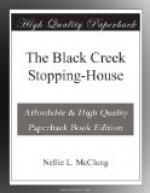This is called selling Pigeons short.
Philip’s friends recommended many and varied things for the pigeons to eat, and he did his best to supply them all, as far as his slender means allowed; he went to the elevator for wheat; he traded his good jack-knife for two mouse-eaten and anaemic heads of squaw-corn, which were highly recommended by an unscrupulous young Shylock, who had just come to town and was short of a jack-knife. His handkerchief, scribblers and pencils mysteriously disappeared, but other articles came in their place: a small round mirror advertising corsets on the back (Gordon Smith said pigeons liked a looking-glass—it made them more contented to stay at home); a small swing out of a birdcage, which was duly put in place (vendor Miss Edie Beal, owner unknown). Of course, it was too small for pigeons, but there were going to be little ones very soon, weren’t there?
He also brought to them one day five sunflower seeds, recommended and sold by a mild-eyed little Murphy girl, who had the stubby fingers of a money-maker. Philip, being very low in funds that day, wanted her to accept prospective eggs in payment, but the stubby-fingered Miss Murphy preferred currency! Philip decided to make no entry of these transactions in his Pigeon Book.
His young brother, Barrie, began to be troublesome about this time, and to evince an unwholesome interest in the pigeons. The ladder, which was placed against the stable under their house, at first seemed to him too high to climb, but seeing the multitude of delighted spectators who went up and down without accident, he resolved to try it, too, and so successfully that he was able after a few attempts to carry a stick with him, stand on the highest rung, and poke up the pigeons.
One day he was caught—with the goods—by Philip himself. So indignant was Philip that for a moment he stood speechless. His young brother, jarred by a guilty conscience and fear of Philip, came hastily down the ladder, raising a few bruises on his anatomy as he came. Even in his infant soul he felt he deserved all he had got, and thought best not to mention the occurrence. Philip, too, generously kept quiet about it, feeling that the claims of justice had been met. The only dissatisfied parties in the transaction were the pigeons.
The next Sunday in Sabbath School there was a temperance lesson, and Barrie Brown quoted the Golden Text with a slight variation—“At the last it biteth like a serpent and stingeth like a ladder!”
Philip was the only one who knew what he meant, and he said it served him good and right.
The following entry appears in the Pigeon Book:
My brother Barrie poks them, but he got his leson. tomoro I’ll let them out—there fond enough of home now I gess.
The next day being Saturday, when Philip could watch them, he let them out. All day long his heart was torn with pride and fear—they looked so beautiful, circling and wheeling over the stable and far away across the road, and yet his heart was chill with the fear that they would never return.




